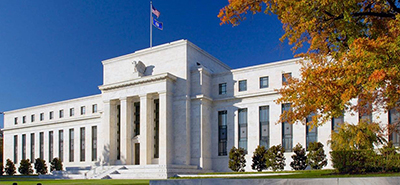
Fed Keeps Rates Steady But Suggests Possible Increase Later This Year

(Federal Reserve headquarters, Washington, D.C.)
The Federal Open Market Committee held rates steady on Wednesday but suggested a possible rate increase later this year.
“The Committee seeks to achieve maximum employment and inflation at the rate of 2 percent over the longer run,” the FOMC said in a statement. “In support of these goals, the Committee decided to maintain the target range for the federal funds rate at 5-1/4 to 5-1/2 percent. The Committee will continue to assess additional information and its implications for monetary policy.”
MBA Senior Vice President and Chief Economist Mike Fratantoni said the decision to hold the federal funds rate steady was not a surprise. “As expected, the Federal Reserve did not change its federal funds rate target at the September meeting,” he said. “However, the FOMC members’ projections signal that they believe they are not yet done in their fight to bring inflation down. The majority of FOMC members still expect another hike this year, even though core inflation has slowed. And many FOMC members now expect that the pace of cuts in 2024 will be somewhat slower than they had thought in June.”
Fratantoni noted MBA expects that inflation will continue to drop closer to the Fed’s target, the job market will continue to slow and that mortgage rates should begin to reflect that the Fed’s moves in 2024 will be cuts – not further increases. “This should provide some relief in terms of better affordability for potential homebuyers,” he said.
The lack of housing inventory remains the biggest challenge for many potential buyers,” Fratantoni said. “While homebuilder sentiment is clearly impacted by the recent surge in mortgage rates, permits for single-family homes provide a positive outlook for the pace of construction in the year ahead. If mortgage rates trend down in 2024 as we anticipate, the combination of more homes for sale and somewhat lower rates should support stronger purchase volume.”
The full FOMC statement:
Recent indicators suggest that economic activity has continued to expand at a modest pace. Job gains have been robust in recent months, and the unemployment rate has remained low. Inflation remains elevated.
The U.S. banking system is sound and resilient. Tighter credit conditions for households and businesses are likely to weigh on economic activity, hiring, and inflation. The extent of these effects remains uncertain. The Committee remains highly attentive to inflation risks.
The Committee seeks to achieve maximum employment and inflation at the rate of 2 percent over the longer run. In support of these goals, the Committee decided to maintain the target range for the federal funds rate at 5 to 5-1/4 percent. Holding the target range steady at this meeting allows the Committee to assess additional information and its implications for monetary policy. In determining the extent of additional policy firming that may be appropriate to return inflation to 2 percent over time, the Committee will take into account the cumulative tightening of monetary policy, the lags with which monetary policy affects economic activity and inflation, and economic and financial developments. In addition, the Committee will continue reducing its holdings of Treasury securities and agency debt and agency mortgage-backed securities, as described in its previously announced plans. The Committee is strongly committed to returning inflation to its 2 percent objective.
In assessing the appropriate stance of monetary policy, the Committee will continue to monitor the implications of incoming information for the economic outlook. The Committee would be prepared to adjust the stance of monetary policy as appropriate if risks emerge that could impede the attainment of the Committee’s goals. The Committee’s assessments will take into account a wide range of information, including readings on labor market conditions, inflation pressures and inflation expectations, and financial and international developments.
Voting for the monetary policy action were Jerome H. Powell, Chair; John C. Williams, Vice Chair; Michael S. Barr; Michelle W. Bowman; Lisa D. Cook; Austan D. Goolsbee; Patrick Harker; Philip N. Jefferson; Neel Kashkari; Lorie K. Logan; and Christopher J. Waller.
